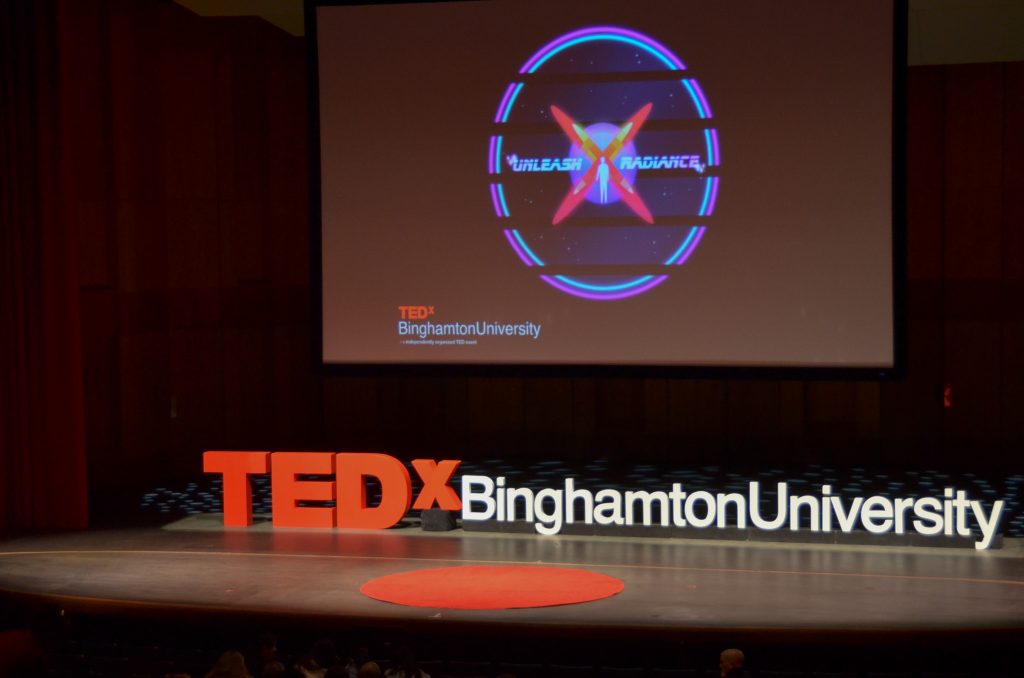
TEDxBinghamtonUniversity “Unleashed Radiance” this past Sunday in its 13th-annual conference.
Held in the Osterhout Concert Theater in the Anderson Center, this year’s TEDx showcased speakers from various fields whose passions drive their work and their efforts at bettering their communities. The theme, “Unleash Radiance,” was to leave an imprint on those passionate within their hobbies and careers that want to give back to their community, according to the TEDxBinghamtonUniversity website.
Three professional speakers, an undergraduate student and an alumna spoke at the event, discussing topics surrounding the challenges they have faced and the skills they have acquired throughout their career. Among the speakers was Sherrell Dorsey, an entrepreneur, journalist and the founder and CEO of The Plug — a digital news and insights platform covering the Black innovation economy. Dorsey discussed how attendees can design their own stories for a better future, explaining that they have to remove biased language and ignore negative stereotypes in stories. In doing this, Dorsey said they will be able to correct our history and find communities who have largely been overlooked or unacknowledged.
Other speakers included Jason Richberg, a Suffolk County Legislator, Shantay Carter, ‘00, a nurse and mentor, and Priyanka Naik, a sustainability chef.
Caitlyn Archibald, a freshman double-majoring in biochemistry and history, spoke about the importance of feminism, as well as how to recognize privilege. Archibald explained that common phrases said since elementary school days, like “boys will be boys” or “girls mature faster than boys,” are excuses used to validate inappropriate behaviors that have been instilled since childbirth.
“Asking some young boys to grab chairs and move tables during elementary school was not ill-intended but continues to belittle women and enforce the separation between genders,” Archibald said. “At the same time that impressionable boys absorb the lessons about how to earn respect in the world of men, they get the complimentary message that what is considered feminine has less value than what is considered masculine. It is a short step from there to the belief that women should be subordinate to men and sexually available to them.”
A 15-minute intermission followed Archibald’s speech, where students from BU Professor Samuel Elikem Kwame Nyamuame’s African dance ensemble performed the Ghanaian recreational dance called “Kpanlogo.”
After intermission, Richberg discussed his upbringing and how he came to be elected to 15th legislative district. He spoke on the challenges he faced, his difficulty in understanding how loud his distractions were and accepting his need to be more patient, and ended his talk by having attendees reflect on their own purpose.
Carter followed, focusing her speech on how turning pain into power can create resilience. She talked about her journey from nursing to creating a nonprofit organization, and how the hardships she faced led her to create strategies for success.
These strategies, which she refers to as “Nurse Carter’s strategies to maximize success,” include collaboration, connect and confidence.
“Collaboration, learning to work with others to be able to inspire change and to make an impact — you always want to surround yourself with positive like-minded people who are going to support you and take you to the next level,” Carter said. Two — connect, you have to be vulnerable and show empathy, you have to be able to be vulnerable so they can see the real you, and in being vulnerable you have to be willing to be open to share yourself and your journey honestly so people can relate to you. Three — confidence. Confidence is knowing who you are, knowing that you are worthy, knowing that you are enough and you are destined to create greatness.”
The last speaker was Naik, who spoke about three principles that could change one’s mindset, as well as how helping the environment can be beneficial for mental health. The three principles were to “let go of what you know,” to “open your mind” and that “our actions have an impact.” Developing a new mindset can lead to an eco-friendly life that can help people be more open to new ideas, according to Naik.
Sophia Yazdi, a freshman majoring in economics, explained why she chose to attend the talks.
“I decided to come because I really wanted to hear about new ideas, and I think I’ve watched a lot of TED talks over the years and they always have some sort of new take on an idea,” Yazdi said. “I think it’s really interesting to see how someone else might view a topic and it really sort of can change your perspective on things.”
Mwende Wagner, a freshman majoring in sociology, said she also enjoyed listening to the talks.
“I also think that in general, it just sounded like something fun to do,” Wagner said. “You know, there’s a student speaker who was also a freshman — as we watched — so it’s kind of cool to see that students are involved in campus events like this.”


